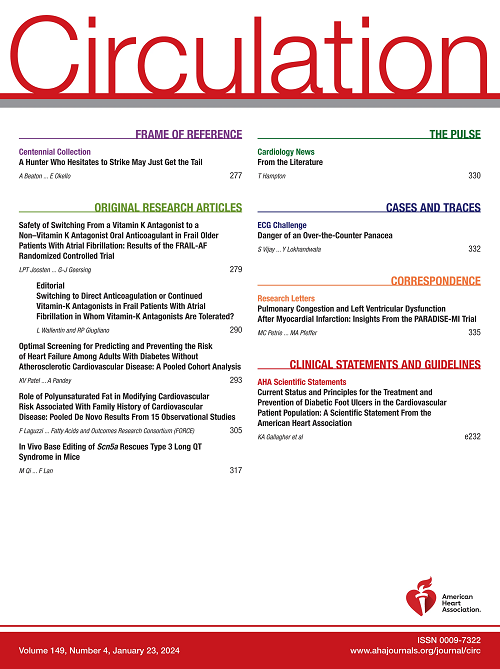Dusp14-Mediated Dephosphorylation of MLKL Protects Against Cardiomyocyte Necroptosis in Hypothyroidism-Induced Heart Failure.
IF 35.5
1区 医学
Q1 CARDIAC & CARDIOVASCULAR SYSTEMS
引用次数: 0
Abstract
BACKGROUND Hypothyroidism leads to multiple organ dysfunction, with the heart the most affected. However, the pathologic mechanism of hypothyroidism-induced heart failure remains to be completely elucidated. Thyroid hormone replacement therapy enhances myocardium systolic function but increases the occurrence of arrythmias. There is an urgent need to explore these mechanisms in detail and to discover and develop drugs that can target and manage heart failure in patients with hypothyroidism. METHODS In this study, a mouse model of hypothyroidism-induced heart failure was established through the administration of propylthiouracil. Dusp14 knockout mice were generated, and adeno-associated virus-mediated cardiomyocyte-specific overexpression of Dusp14 (dual specificity phosphatase 14) was used in combination with related cellular experiments to investigate the protective effects of Dusp14 on hypothyroidism-induced heart failure. Further analyses confirmed the crucial involvement of necroptosis in the pathogenesis of hypothyroidism-induced heart failure, and demonstrated the protective role of Dusp14 in modulating necroptosis. In addition, a novel small molecule compound that effectively regulates Dusp14 activity in vitro was identified through molecular docking, providing a potential therapeutic avenue. RESULTS Dusp14 regulates necroptosis and mitigates hypothyroidism-induced heart failure. Myocardial tissue sections from mice in the hypothyroidism group showed positive Evans blue dye staining, and the serum levels of the myocardial injury marker lactate dehydrogenase were significantly higher compared with the euthyroid group (n=8). In addition, phosphorylation levels of the necroptosis marker MLKL (mixed lineage kinase domain-like protein) were significantly elevated, indicating the activation of necroptosis (n=8). These findings suggest that myocardial necroptosis is activated during hypothyroidism. Myocardial-specific overexpression of Dusp14 reduced myocardial necroptosis and improved myocardial contractile function in hypothyroid mice (n=8). In contrast, Dusp14 knockout exacerbated myocardial contractile dysfunction and necroptosis in these mice (n=5-7). These results indicate that Dusp14 alleviates hypothyroidism-induced heart failure by inhibiting necroptosis. P077-0472, a small molecule compound, was identified as an activator of Dusp14, which could inhibit cardiomyocyte necroptosis from hypothyroidism (n=6). CONCLUSIONS Dusp14 inhibits cardiomyocyte necroptosis from hypothyroidism and consequently rescues damaged cardiomyocytes. P077-0472, a novel small molecule compound that activates the dephosphorylation function of Dusp14, could inhibit cardiomyocyte necroptosis from hypothyroidism.dusp14介导的MLKL去磷酸化对甲状腺功能减退引起的心力衰竭心肌细胞坏死的保护作用
背景:甲状腺功能减退可导致多器官功能障碍,其中以心脏功能障碍最为严重。然而,甲状腺功能减退导致心力衰竭的病理机制仍未完全阐明。甲状腺激素替代疗法增强心肌收缩功能,但增加心律失常的发生。目前迫切需要详细探索这些机制,并发现和开发能够靶向和治疗甲状腺功能减退患者心力衰竭的药物。方法应用丙硫脲嘧啶建立甲状腺功能减退性心力衰竭小鼠模型。制备Dusp14基因敲除小鼠,利用腺相关病毒介导的心肌细胞特异性过表达Dusp14(双特异性磷酸酶14),结合相关细胞实验,探讨Dusp14对甲状腺功能减退性心力衰竭的保护作用。进一步的分析证实了坏死性上睑下垂在甲状腺功能减退引起的心力衰竭发病机制中的重要作用,并证实了Dusp14在调节坏死性上睑下垂中的保护作用。此外,通过分子对接发现了一种新型的小分子化合物,可以在体外有效调节Dusp14的活性,为其提供了潜在的治疗途径。结果dusp14调节坏死性上睑下垂,减轻甲状腺功能减退引起的心力衰竭。甲状腺功能减退组小鼠心肌组织切片Evans蓝染色阳性,血清心肌损伤标志物乳酸脱氢酶水平明显高于甲状腺功能减退组(n=8)。此外,坏死下垂标记物MLKL(混合谱系激酶结构域样蛋白)的磷酸化水平显著升高,表明坏死下垂激活(n=8)。这些结果提示心肌坏死性下垂在甲状腺功能减退时被激活。心肌特异性过表达Dusp14可减少甲状腺功能减退小鼠心肌坏死下垂,改善心肌收缩功能(n=8)。相反,Dusp14基因敲除加重了这些小鼠的心肌收缩功能障碍和坏死性下垂(n=5-7)。这些结果表明Dusp14通过抑制坏死性上睑下垂减轻甲状腺功能减退引起的心力衰竭。一种小分子化合物P077-0472被鉴定为Dusp14的激活剂,可以抑制甲状腺功能减退引起的心肌细胞坏死(n=6)。结论sdusp14可抑制甲状腺功能减退引起的心肌细胞坏死,从而挽救受损的心肌细胞。P077-0472是一种激活Dusp14去磷酸化功能的新型小分子化合物,可以抑制甲状腺功能减退引起的心肌细胞坏死。
本文章由计算机程序翻译,如有差异,请以英文原文为准。
求助全文
约1分钟内获得全文
求助全文
来源期刊

Circulation
医学-外周血管病
CiteScore
45.70
自引率
2.10%
发文量
1473
审稿时长
2 months
期刊介绍:
Circulation is a platform that publishes a diverse range of content related to cardiovascular health and disease. This includes original research manuscripts, review articles, and other contributions spanning observational studies, clinical trials, epidemiology, health services, outcomes studies, and advancements in basic and translational research. The journal serves as a vital resource for professionals and researchers in the field of cardiovascular health, providing a comprehensive platform for disseminating knowledge and fostering advancements in the understanding and management of cardiovascular issues.
 求助内容:
求助内容: 应助结果提醒方式:
应助结果提醒方式:


